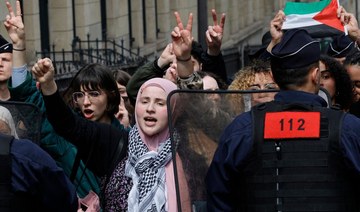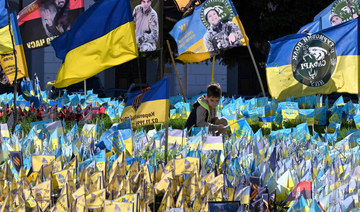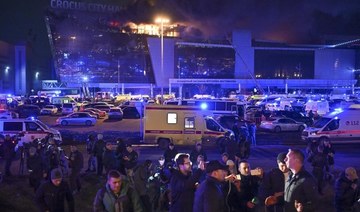BLAHODATNE, Ukraine: Joyous residents welcomed arriving Ukrainian troops in the center of Kherson on Friday after Russia abandoned the only regional capital it had captured since its invasion in February.
Russia said it had withdrawn 30,000 troops across the Dnipro River without losing a single soldier. But Ukrainians painted a picture of a chaotic retreat, with Russian troops ditching their uniforms, dropping weapons and drowning while trying to flee.
The withdrawal marked the third major Russian retreat of the war and the first to involve yielding such a large occupied city in the face of a major Ukrainian counter-offensive that has retaken swathes of the country’s east and south.
Video footage verified by Reuters showed dozens of people cheering and chanting victory slogans in the southern Ukrainian city’s central square, where the apparent first Ukrainian troops to arrive snapped selfies in the throng.
Two men hoisted a female soldier on their shoulders and tossed her into the air. Some residents wrapped themselves in Ukrainian flags. One man was weeping with joy.
Ukraine’s defense intelligence agency said Kherson was being restored to Ukrainian control and ordered any remaining Russian troops to surrender to Kyiv’s forces entering the city.
Locals had placed Ukrainian flags in the square as news of the end of more than eight months of occupation filtered out.
“Glory to Ukraine! Glory to the Heroes! Glory to the Nation!” one man shouted in another video verified by Reuters.
As Ukrainian forces surged forward during one of the most humiliating Russian retreats of the war, villagers came out of hiding and, amid tears of relief and joy, described how Russian troops had killed residents and looted homes.
Reuters could not independently verify the accounts and Russia’s defense ministry did not immediately respond to questions about allegations made by residents of the recaptured village of Blahodatne, 20 km (12 miles) north of Kherson.
Serhii Kalko, 43, one of roughly 60 people who stayed in Blahodatne out of a pre-war population of 1,000, was struck by how quiet the final Russian retreat had been. “They left silently. They didn’t even speak with each other,” he said.
Previously, “there was shooting all the time from three directions,” said a tearful but ecstatic Halyna, a diminutive 81-year-old woman standing beside her rusty bicycle. “But they left two nights ago. Now they need to leave Kherson.”
Kherson returns to Ukrainian control
Serhiy Khlan, a member of Ukraine’s regional council for Kherson, said the regional capital was now almost fully under the control of Ukrainian forces.
A large number of Russian soldiers had drowned in the river trying to escape and others had changed into civilian clothing, he said, advising residents not to leave their homes while searches for remaining Russian troops took place.
Natalia Humeniuk, a spokesperson for the Ukrainian military’s southern command, said “saboteur operations cannot be ruled out” by Russian troops in civilian clothes.
Earlier, the Russian defense ministry said it had finished its withdrawal from the western bank of the Dnipro river, where Kherson city lies, two days after Moscow announced the retreat.
“Not a single unit of military equipment or weapons have been left on the right (western) bank. All Russian servicemen crossed to the left bank,” it added, saying that Russia had not suffered any loss of personnel or equipment.
Pro-Russian war bloggers had reported late on Thursday that Russian forces crossing the river were coming under heavy fire from Ukrainian forces. The Russian ministry said Ukrainian forces had struck Dnipro river crossings five times overnight with US-supplied HIMARS rocket systems.
Ukraine’s advance unfolded far more rapidly than Ukrainian officials had suggested just hours earlier. Defense Minister Oleksii Reznikov had told Reuters on Thursday it would take at least a week for Russia to pull out of Kherson.
“They managed to scarper, the scum,” tweeted Oleksiy Arestovych, an adviser to President Volodymyr Zelensky. “There are not many prisoners, mainly losses. But trophies enough.”
Ukrainian social media brimmed with celebratory messages and elation. Many businesses and official institutions, from national mail carrier Ukrposhta to the National Anti-corruption office, inserted images of watermelons into their profiles. The Kherson region is nationally renowned for its watermelons.
“Stealing everything”
There was no sign of Russian forces when Reuters reached Blahodatne. Relieved villagers recounted life under occupation, saying about 100 Russians had held the village for eight months.
The Russians had withdrawn without a fight on Wednesday and Ukrainian troops moved in on Thursday, they said.
The Russians had killed a man who had approached too close to their trenches and taken away two other men and a young woman whose fate remained unknown, the villagers said.
“For the first two months they came in and were extremely aggressive,” said villager Kalko, adding that Russian soldiers fired in the air as they walked down the streets.
The Russian troops had also broken into vacant homes and looted them, removing furniture, televisions, stoves and refrigerators, the villagers said.
Russian reverses
Moscow’s forces were driven from the outskirts of the capital Kyiv in March and ousted from the northeastern region of Kharkiv in September.
Kherson province is one of four that Russian President Vladimir Putin claimed to have annexed from Ukraine in late September.
The loss of the regional capital would appear to dash dreams voiced by some Russians of seizing Ukraine’s entire Black Sea coast, although Kremlin spokesman Dmitry Peskov said the region’s annexed status remained unchanged.
The only road route near Kherson across the Dnipro river, the already damaged Antonivskiy bridge, collapsed. Russian military bloggers said it was probably blown up as Russian troops withdrew.
The Russian defense ministry said it had adopted “defensive lines and positions” on the eastern bank of the river, which Moscow hopes it will be able to better supply and defend.
Peskov said the decision to retreat was taken by the defense ministry. Asked by reporters if it was humiliating for Putin, Peskov said: “No.”
Ukrainian troops met with joy in Kherson as Russia abandons biggest prize
https://arab.news/5fauz
Ukrainian troops met with joy in Kherson as Russia abandons biggest prize

- Reports of Russian troops ditching uniforms, dropping weapons and drowning while trying to flee
- Ukrainian social media brimmed with celebratory messages and elation
Family of 7-year-old girl trampled on boat while crossing Channel feared repatriation to Iraq

- Sara Alhashimi was crushed to death when a large group of men rushed onto an overloaded inflatable dinghy she had boarded with her parents and 2 siblings
- Her father says his family was told they were to be deported to his home country of Iraq after living in Europe for 14 years
LONDON: A seven-year-old Iraqi girl was crushed to death in a small, overcrowded boat as her family, who feared repatriation to Iraq after years living in Europe, attempted to cross the English Channel from France to the UK, the Guardian reported on Wednesday.
Sara Alhashimi was with her father Ahmed Alhashimi, mother Nour Al-Saeed, 13-year-old sister Rahaf and 8-year-old brother Hussam when they boarded an inflatable dinghy at Wimereux, south of Calais, last Tuesday.
But Alhashimi, 41, said that as it set sail, a large group of men rushed onboard and he lost his grip on his daughter. Unable to move because of the crush, he could not reach her and she was trampled. Four other people also died.
Alhashimi said he left Basra around 2010 after he was threatened by an armed group. Sara, his youngest child, was born in Belgium. The family had also lived in Sweden and submitted asylum applications to several EU countries but all were rejected. Their attempt to cross the channel last week was their fourth in two months since arriving in the Pas de Calais region, after police prevented the previous crossings.
Alhashimi told the BBC: “If I knew there was a 1 percent chance that I could keep the kids in Belgium or France or Sweden or Finland I would keep them there.
“All I wanted was for my kids to go to school. I didn’t want any assistance. My wife and I can work. I just wanted to protect them and their childhoods and their dignity.”
Smugglers promised a guaranteed place on a boat carrying 40 migrants for €1,500 ($1,600) per adult and €750 per child, Alhashimi said.
Sara was calm, he added, as he held her hand while they walked from a railway station and then hid in dunes overnight while waiting to board their vessel. The smugglers told the group to inflate the boat shortly before 6 a.m., carry it toward the shore and run as they approached the water.
As they did so, however, a teargas canister thrown by police went off beside them, Alhashimi said, and Sara began to scream. He had been carrying her on his shoulders but once inside the dinghy he put her down so he could help daughter Rahaf get onboard.
As he tried to reach Sara in the increasingly overcrowded boat, Alhashimi said he begged a Sudanese man, who had joined them at the last minute, to get out of the way. He even punched the man, with little effect.
“I just wanted him to move so I could pull my baby up,” he said. “That time was like death itself … We saw people dying. I saw how those men were behaving. They didn’t care who they were stepping on — a child, or someone’s head, young or old. People started to suffocate.
“I could not protect her. I will never forgive myself. But the sea was the only choice I had.”
Alhashimi said was only able to reach Sara after French rescuers had arrived at the boat and removed some of the 112 people onboard.
“I saw her head in the corner of the boat,” he said. “She was all blue. She was dead when we pulled her out. She wasn’t breathing.”
Belgium recently rejected an asylum claim by the family on the grounds that Basra was a safe place for them to return to. They had spent the past seven years living with a friend in Sweden.
“Everything that happened was against my will,” said Alhashimi. “I ran out of options. People blame me and say, ‘how could I risk my daughters?’ But I’ve spent 14 years in Europe and have been rejected.”
Colombia to cut diplomatic ties with Israel

- “Tomorrow (Thursday) diplomatic relations with the state of Israel will be severed... for having a genocidal president,” Petro told a May Day rally in Bogota
- Petro, Colombia’s first leftist president, has also asserted that “democratic peoples cannot allow Nazism to reestablish itself in international politics“
BOGOTA: Colombian President Gustavo Petro said Wednesday his country will sever diplomatic ties with Israel, whose leader he described as “genocidal” over its war in Gaza.
“Tomorrow (Thursday) diplomatic relations with the state of Israel will be severed... for having a genocidal president,” Petro, a harsh critic of the devastating war against Hamas, told a May Day rally in Bogota.
Petro has taken a critical stance on the Gaza assault that followed an unprecedented Hamas attack on southern Israel on October 7 — which resulted in the deaths of some 1,170 people, mostly civilians, according to Israeli figures.
In October, just days after the start of the war, Israel said it was “halting security exports” to Colombia after Petro accused Israeli Defense Minister Yoav Gallant of using language about the people of Gaza similar to what the “Nazis said of the Jews.”
Petro, Colombia’s first leftist president, has also asserted that “democratic peoples cannot allow Nazism to reestablish itself in international politics.”
In February, Petro suspended Israeli weapons purchases after dozens of people died in a scramble for food aid in the war-torn Palestinian territory — an event he said “is called genocide and recalls the Holocaust.”
In the October attack, Hamas militants also took about 250 hostages, 129 of whom remain in Gaza, including 34 Israel says are presumed dead.
Israel’s retaliatory offensive has killed at least 34,568 people in Gaza, mostly women and children, according to the health ministry in the Hamas-run territory.
UK auction house removes Egyptian skulls from sale after outcry
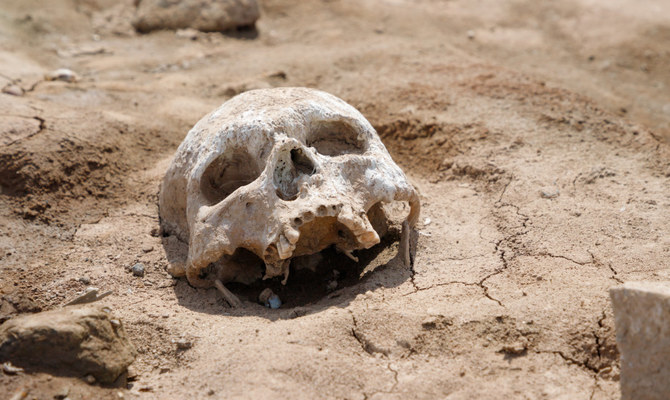
- Lawmaker condemns trade as ‘gross violation of human dignity’
- Items were part of collection owned by English archaeologist Augustus Pitt Rivers
LONDON: A UK auction house has removed 18 ancient Egyptian human skulls from sale amid condemnation by a member of Parliament, The Guardian reported.
Labour MP Bell Ribeiro-Addy said the sale of human remains for any purpose should be outlawed and described the trade as a “gross violation of human dignity.”
Semley Auctioneers in Dorset had listed the skulls with a guide price of £200-£300 ($250-$374) for each lot. The collection included 10 male skulls, five female and three of an uncertain sex.
Some of the skulls were listed as coming from Thebes and dating back to 1550 B.C.
They were originally collected by Augustus Henry Lane Fox Pitt Rivers, an English soldier and archaeologist who established the Pitt Rivers Museum in Oxford, which contains about 22,000 items.
After being housed at a separate private museum on his estate, the skulls were sold as part of a larger collection to his grandson, George Pitt Rivers, who was interned during the Second World War for supporting fascist leader Oswald Mosley.
Ribeiro-Addy said: “This despicable trade perpetuates a dark legacy of exploitation, colonialism and dehumanization. It is a gross violation of human dignity and an affront to the memory of those whose lives were unjustly taken, or whose final resting places were desecrated.
“We cannot allow profit to be made from the exploits of those who often hoped to find evidence for their racist ideology. It is imperative that we take decisive action to end such practices and ensure that the remains of those who were stolen from their homelands are respectfully repatriated.”
Britain has strict guidelines on the storage and treatment of human remains, but their sale is permitted provided they are obtained legally.
Saleroom, an online auction site, removed the skulls from sale after being contacted by The Guardian. Its website states that human remains are prohibited from sale.
A spokesperson said: “These items are legal for sale in the UK and are of archaeological and anthropological interest.
“However, after discussion with the auctioneer we have removed the items while we consider our position and wording of our policy.”
Prof. Dan Hicks, Pitt Rivers Museum’s curator of world archaeology, said: “This sale from a legacy colonial collection that was sold off in the last century shines a light on ethical standards in the art and antiquities market.
“I hope that this will inspire a new national conversation about the legality of selling human remains.”
Some of the skulls in the auction had been marked with phrenological measurements by the original collector, he said.
“The measurements of heads in order to try to define human types or racial type was something that Pitt Rivers was continuing to do with archaeological human remains in order to try to add to his interpretations of the past.”
UK students launch fresh wave of pro-Palestine protests

- Activists plan rallies and encampments on campuses across the country
- They aim to persuade universities to divest from arms companies supplying weapons to Israel
LONDON: Students in the UK are launching a fresh round of demonstrations against the war in Gaza.
The latest protests were expected to begin on Wednesday on the campuses of at least six British universities, including Sheffield, Bristol, Leeds and Newcastle, The Guardian newspaper reported. They come at a time when authorities in the US are violently cracking down on similar demonstrations.
The British students are demanding that their universities divest from arms companies that supply weapons to Israel, and in some cases that they sever all academic ties with Israeli institutions.
In Britain, regular mass public marches in London and other cities have attracted most of the attention surrounding the pro-Palestinian protest movement, with little attention so far paid to demonstrations at universities.
However, recent events in the US, including massive protests at Columbia University in New York, have encouraged student demonstrators in Britain to ramp up their efforts.
A coalition of “staff, students and alumni” at Sheffield and Sheffield Hallam universities have established an encampment in solidarity with the Palestinian people, as part of a group calling itself the Sheffield Campus Coalition for Palestine. This week, students are expected to stage walkouts from lectures and take part in a demonstration in Sheffield.
Similar activities are expected in Newcastle, organized by a group called Newcastle Apartheid off Campus. More than 40 students at the city’s university reportedly have set up an encampment on campus and planned to stage a rally on Wednesday. Organizers said students are protesting against Newcastle University’s partnership with defense firm Leonardo SpA, which produces the laser guidance system for the F-35 jets that have been used by the Israeli military in Gaza.
They added: “Although the student union has passed motions with 95 percent of people in favor of calling for the university to end its ties with Leonardo, and multiple ‘Leonardo off Campus’ protests on its campus, it is clear that the university has not listened to students’ concerns.”
Students in Leeds and Bristol are involved in similar activities, including rallies and encampments.
A spokesperson for Universities UK, which represents 142 academic institutions, said: “Universities are monitoring the latest news on campus protests in the US and Canada.
“As with any high-profile issue, universities work hard to strike the right balance between ensuring the safety of all students and staff, including preventing harassment, and supporting lawful free speech on campus. We continue to meet regularly to discuss the latest position with university leaders.”
Russians throng to display of Western ‘trophy’ tanks captured in Ukraine
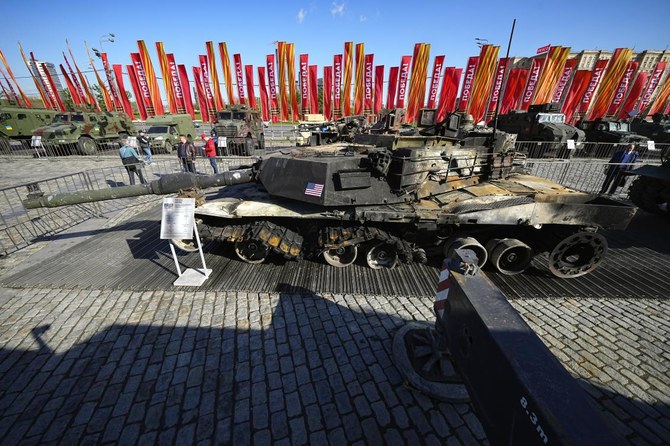
- Long queues of people formed on what was a sunny May Day public holiday at the entrance to the exhibition, entitled “Trophies of the Russian Army“
- “History is repeating itself,” the Russian Defense Ministry said in a statement
MOSCOW: Western tanks and military hardware captured by Russian forces in Ukraine went on display in Moscow on Wednesday at an exhibition the Russian military said showed Western help would not stop it winning the war.
Long queues of people formed on what was a sunny May Day public holiday at the entrance to the exhibition, entitled “Trophies of the Russian Army,” which is being held outside a museum celebrating the Soviet victory over Nazi Germany in 1945.
“History is repeating itself,” the Russian Defense Ministry said in a statement, adding that the Soviet Union had in 1943 also put on a display of captured tanks and hardware, in this case from the German army.
“Strength is in the truth. It’s always been that way. In 1943 and today. These war trophies reflect our strength. The more of them there are, the stronger we are,” the ministry stated, predicting a Russian victory in what it officially calls its “special military operation” in Ukraine.
“No Western military equipment will change the situation on the battlefield,” the statement added.
According to Western and Ukrainian critics, much of Russia’s military hardware is old or outdated, and Russian battlefield gains have resulted from sheer force of numbers and high casualties. Both sides keep the number of dead and injured a secret but are known to have suffered heavy losses.
The Moscow display, which includes US, German and French tanks supplied to Ukraine, came days after the US approved a $61 billion aid package for Kyiv and after Russia made some swift but incremental territorial gains in eastern Ukraine at a time when Kyiv’s forces say they lack ammo and manpower.
Ukraine, whose President Volodymyr Zelensky says it will eventually push Russian forces from its soil, held a similar exhibition along Kyiv’s central boulevard last summer featuring burnt-out husks of Russian tanks and fighting vehicles.
Russia, says the International Institute for Strategic Studies, has itself lost over 3,000 tanks in Ukraine amounting to its entire pre-war active inventory, but has enough lower-quality armored vehicles in storage for years of replacement and says it is now ramping up production of new tanks.
In addition to tanks, British and Australian armored vehicles seized in Ukraine are on display in Moscow along with military hardware made in Turkiye, Sweden, Austria, Finland, South Africa and the Czech Republic.
State TV’s Channel One said the star of the show was a captured American M1 Abrams battle tank, which it said had been taken out by Russian forces in eastern Ukraine using a guided rocket and kamikaze drones.
Clambering over the Abrams holding his microphone, a state TV correspondent told Russians that the tank had been billed in the United States as an indestructible “wonder weapon.”
“But that was all nonsense — look at this — all of its reputation has been destroyed,” he said.













